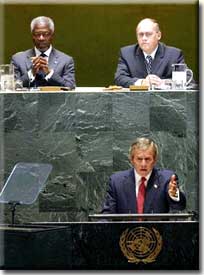Iraq After Hussein: A Road Map for Transition
Image on left: President George W. Bush outlines the threat from Iraq at a special address to the UN General Assembly September 2, 2002. (White House Photo: Paul Morse)
 With the looming possibility of regime change in Iraq, four Iraqi experts presented a road map for affecting a smooth transition to a new and more stable government and economy there. Hosted by the Institute on November 8, the session examined such issues as:
With the looming possibility of regime change in Iraq, four Iraqi experts presented a road map for affecting a smooth transition to a new and more stable government and economy there. Hosted by the Institute on November 8, the session examined such issues as:
- Shaping a transitional government that would develop permanent political institutions;
- Developing a means of delegating governing authority to Iraq's 18 provinces;
- Crafting a strategy for rebuilding the country's infrastructure; and
- Finding a way to revitalize Iraq's private sector.
Moderated by Richard Kauzlarich, director of the Institute's Special Initiative on the Muslim World, the discussion was webcast live (audio only) and followed by questions from the floor and the Internet audience.
Speakers
- Talib Aziz
Founding Member, Iraqi National Congress - Laith Kubba
Senior Program Officer, Middle East and North Africa, National Endowment for Democracy - Rubar S. Sandi
Founder, Chairman and CEO of Corporate Bank Business Group - Fareed Yassen
Technology Consultant - Richard Kauzlarich, Moderator
Director, Special Initiative on the Muslim World, U.S. Institute of Peace



